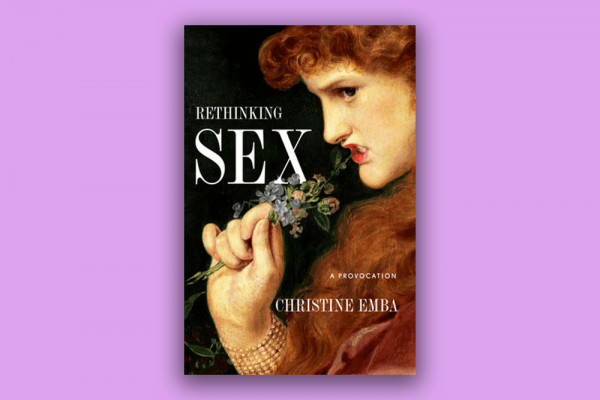Single adults make up one-third of the United States, and while some are happy to be single, others are still in search of partners. In a shift from pre-pandemic trends, singles now crave emotional stability above all else. Casual dating is declining and intentional dating — dating with end goals of lifetime partnership or children or both — is on the rise. Which is why Christine Emba’s book Rethinking Sex: A Provocation seems incredibly relevant: During a time in which we are rethinking what we want from sex and from relationships, Emba argues that sexual liberation hasn’t really made us happier. On that, she’s right.
Emba, a columnist at The Washington Post, has clearly educated herself on the malaises of modern dating — not just in her own life, but through dozens of interviews for Rethinking Sex. In the introduction, Emba states what goal she has for readers of her book:
Rethinking Sex is not just about rethinking sex, the act. It is a way that we approach our bodies, our relationships, ourselves, and those around us. It’s rethinking the possibility of what sex could be and raising our expectations. It’s not just finding ways to prevent disappointment—it’s finding out how to pursue joy.
The end goal is a good one. But the way she gets there is through reiterating gender roles and differences, decrying kink culture and casual sex, and attaching the values of purity to our sexual encounters. Emba, writing specifically of the “bad” sex that many of us have experienced, writes, “We trivialize ourselves and our importance in the world accepting as truth the feeling that our own desires, pleasures, or pains should not and will not determine our choices and our outcomes. We objectify ourselves, often in the ugliest way.”
At times, Emba’s writing felt reminiscent of youth group sermons about sex. She believes that “modern sexual liberals have mainstreamed the idea that sex means nothing,” which I don’t believe is true. More importantly, she argues that a consent-only approach to sex has made us unhappy and states that even consensual sex can be “damaging to an individual, to their partner, to society.” For anyone living firmly in a modern and secular world, this may all certainly seem like a heterodox approach.
Emba’s conclusion, that sexual ethics must exist beyond consent, is one that I fully agree with. “Consent only asks if we have said yes or not; if yes, it assumes that the sex we then start having is good,” she writes. “But it’s often not, and it can damage us to the precise depths that sex reaches within us.” The question is — what kind of consensual sex is considered “damaging?”
While Rethinking Sex maintains a nearly secular perspective throughout, toward the end of the book she draws on 13th-century theologian Thomas Aquinas’ definition of love, which is that we should be “willing the good of the other” and creating goodwill in our relationships and interactions with other people. The concept is a decidedly universal one, but Emba applies it directly to love and sex: Good sex is not just consensual, but also must be good for all parties involved — not just pleasurably, but also emotionally, physically, and psychologically. I agree.
Emba argues that we are throwing the baby out with the bathwater when it comes to aspects of traditional sexual ethics, or ethics informed mostly by religious traditions that have primarily involved gender roles, monogamy, abstinence outside of marriage, heterosexuality, and the end result of a relationship involving marriage and children. While Emba says it’s is a little ludicrous to expect sexual abstinence in a modern world, she doesn’t see these traditional ethics as all bad, stating that “even the most restrictive Christian prohibitions on sex actually provide a positive vision of what sex can be.” Conversely, Emba is overly critical of the sexual liberation movement. She believes that liberated sex comes “without norms and boundaries” and “we don’t know where things will stop—so we’re afraid to start at all.” Her argument continues saying that sex “could be a delightful space of possibility. But without limitations, we’re too worried to really enjoy ourselves.” She doesn’t state exactly what sexual “limitations” we should be enacting on ourselves.
While her critiques of consent-only sexual ethics that often fail to address the emotional well-being of the participants may be warranted, she overlooks how life-saving this framework and the sexual liberation movement have been for the LGBTQ community and for those of us raised with extreme views on what sex should look like. Emba states repeatedly that her book is primarily intended for cisgender heterosexuals, but it seems like a huge oversight to leave out the LGBTQ perspective as she critiques a culture of sexual liberation.
Emba, a former nondenominational evangelical who later converted to Catholicism, mentions multiple times that she escaped some of the worst parts of purity culture in her own upbringing. I did not.
My sex education consisted of crass comparisons of my virginity to a “wrapped present” for my future spouse that would be forever lost if I chose to unwrap it, a pledge to stay chaste until marriage, and of course, a True Love Waits ring. While today’s schools may teach a still-inadequate sex education that focuses merely on safe sex and maybe consent, mine never did.
Today, I identify as a polyamorous Christian — or a Christian who happens to have multiple partners, including two who live with me and my children. To arrive here, I have had to re-examine the intersection of sex and faith and what it means to have ethical sex. I was raised in a fundamentalist Christian home and was expected to maintain my purity until marriage. I got engaged at 19, married at 20, and had two children by age 25. My attempts to live out traditional sexual ethics led me to oppress parts of me that often fell in love with other people, or parts of me that were attracted to other genders. Ultimately, my husband and I found love outside our marriage while still maintaining love inside our marriage. We did this while also maintaining our deeply held faith.
Emba states that her “social milieu is educated, young, forward-thinking” and these are the sorts of people she has interviewed for her book — single, professional, educated people, mostly women, who have been unsuccessful in romance, who are concerned about their biological clocks ticking, and who have had unsatisfactory dating lives centered around casual encounters. For people who have been raised in a liberal, feminist, educated environment where they were made to feel as if having sex was no big deal and that casual sex was an expected part of dating, and later found all of this quite lacking, Emba’s book might be extraordinarily refreshing. It is true that people these days may feel forced into non-monogamy or kinks that they do not wish to pursue, and may wish to consider how the downsides of hookup culture might be affecting them.
But for those of us raised in environments where anything other than heterosexual, vanilla sex for cisgender people within the confines of marriage would send you to hell — where sexual assault was at least partially the fault of the victim, where your purity and spirituality were directly tied to the status of your virginity — Rethinking Sex might feel dismissive as it overtly dances around touchy subjects like gender roles, birth control, and same-sex couplings. In her chapter on the sexual and biological differences between men and women, she states that “different can just mean different, not worse.” Emba wants us to respect those differences when we think about sex and dating. But that’s the sort of argument I’ve seen used to defend complementarianism, the theological view that men and women should be forced into roles based on their biological sex, for years.
Emba’s book offers no examples of healthy open relationships, nor examples of people who actually enjoy what Emba refers to as “problematic” kinks, despite the fact that we do exist. For people recovering from the effects of severe purity culture who want to explore a less strict take on sexuality from a faith-based perspective, a book like Shameless: A Sexual Reformation by Nadia Bolz-Weber might be more helpful. Bolz-Weber writes about freeing yourself from the constraints of purity culture and traditional sexual ethics without the need to leave your faith behind, a concept that has certainly been important for many, myself included.
The way we think about sex certainly needs to change, but I don’t believe that it will change for the better if we take Emba’s advice to completely reject sexual liberation and continue to ignore our own sexual desires around non-monogamy, kink, same-sex couplings, or casual sex when there are people who are engaged in them in a consensual and healthy manner every single day. Because at the end of the day, Emba’s arguments about sexual liberation felt like they could have been solved with self-reflection and good emotional boundaries.
I don’t think we need limitations in order to have good sex. What I do think we need is honest communication, not only with your partner(s), but with yourself, about what you actually want, whether it’s to save sex for marriage or sex that is casual, but respectful. People — including adults — need a comprehensive sex education that centers not only birth control and consent, but also emotional well-being and the ability to advocate for our own wants to others and ourselves. Emba and I agree on that, but we ultimately differ on what constitutes healthy sex. When we’re rethinking sex, I hope we aren’t simply turning back toward a more “woke” form of purity culture.
Sojourners has partnered with Bookshop.org; when you order books through the links on sojo.net, Sojourners earns a small commission and Bookshop.org sends a matching commission to independent bookstores.
Got something to say about what you're reading? We value your feedback!





